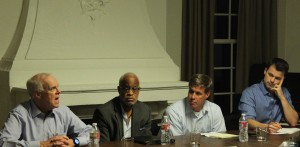
In an event titled “Defining Manhood: What Can Men at Stanford Do?” Stanford President John Hennessy and Vice Provost Harry Elam spoke at the Sigma Nu house on March 10, along with Hoover Fellow Joseph Felter Ph.D. ’05 and associate professor of sociology, Robb Willer.
The panel concluded the “Fraternity engagement with gender issues: to know, to understand, to act” speaker series held by Sigma Nu in collaboration with the Feminist, Gender, and Sexuality Studies program. The four-part series was designed to engage the fraternity and Stanford community members with gender issues. Sigma Nu decided to create the series following discussions in the fall about the role of fraternity members in sexual assault issues across campuses nationally.
Former Sigma Nu president and self-proclaimed feminist Patrick Cirenza ’15 moderated the event. Cirenza prompted the discussion with three questions, followed by questions from the audience.
Cirenza first asked the four speakers how they defined masculinity and whether this definition has ever restricted them. Willer provided a scholarly definition of masculinity.
“Roughly speaking, it is the set of social norms that are generally expected among men,” Willer said. “Homophobia is one of the traditional ways that men can define their manhood by insulting other men’s masculinity.”
Willer explained that men can be held to stricter gender behavior expectations than women. For example, a young girl transgressing gender stereotypes is often just called a tomboy, while boys who don’t always display masculinity are negatively described as weak, or “sissies.” This can unfortunately lead to boys overcompensating with their male traits.
“I wish I could say I’ve always stood up for my values, but I’d be lying to you if I said this,” Willer said.
Hennessy encouraged students to maintain values of integrity, fairness, equity, empathy and respect for individuals, regardless of gender distinctions even in difficult situations.
“I think of myself not just as a man but as a member of the human race,” he said.
Felter, a retired U.S. Army Colonel who pursued a career as Special Forces and foreign area officer, explained that military stereotypes and the male-driven culture can be restricting, especially when hiding weakness and pain are core determinants of strength.
When Felter attended West Point Academy, they would regularly hold “cattle calls,” bussing groups of college and high school women to the academy for the men’s entertainment. He discussed the attitude among soldiers.
“I was raised in a cauldron of male masculinity…If you want to be studly, show determination; don’t stop until you get what you want,” Felter said.
Cirenza told the audience about Sigma Nu’s actions against gender biases, specifically policing gender language, such as casual use of the word “bitch.” He then asked the speakers to describe times where they have intervened to prevent a potential conflict between a man and woman.
Both Hennessy and Elam spoke about instances in their careers where they have seen women treated as inferior. When evaluating women for faculty and board positions, Hennessy has noticed a strong gender bias, where successful women are often portrayed as too aggressive or “too out there.” Traits that are admired in men are seen as a disadvantage to women.
Elam emphasized that the most important thing to do to prevent discrimination and potential instances of sexual harassment is to foster self-respect.
“I’m not talking about the easy definition, but a rigorous sense of knowing yourself in the situation – recognizing and knowing how you feel about the situation and how to act,” he said.
Cirenza also asked the panelists what tangible actions Stanford students can take to change gender relations, along with discrimination against class and race, in Greek life and on campus more broadly.
All four speakers emphasized that Hennessy and other Stanford officials cannot change the campus culture – this can only come from the students and other community members.
For Greek life specifically, Hennessy said that just because Greek organizations are single-gender does not mean their behavior should be any different than the rest of campus. He explained that freshmen look up to fraternities and sororities, as well as the 700 other student groups on campus, so older members can have a strong influence on the image younger students interpret.
According to Hennessy, all students, whether Greek or not, should be held to the same standards by their peers.
Elam encouraged fostering healthy relationships and creating an ongoing dialogue that does not end with New Student Orientation events. In order to prevent sexual assault and gender biases nationally, Elam encouraged all Stanford students to actively participate in positive behavior and hold other students accountable for their language and actions.
“Why can’t we be the first school to say that this is it, and it’s not going to happen anymore?” Elam asked.
Kate Wendell ’15, who attended the event, shared similar beliefs.
“[The event] was a good reminder of how we as a student body should be policing our own behavior to create a culture on campus where all people feel safe and celebrated,” Wendell said. “I feel empowered to intervene in situations where I think someone might be discriminating against another person. I particularly liked the idea of creating gender norms that are flexible and that allow everyone to be their true selves.”
Next year, Stanford will offer a for-credit speaker series class at Sigma Nu’s house.
Contact Sophie Stuber at sstuber8 ‘at’ stanford.edu.
